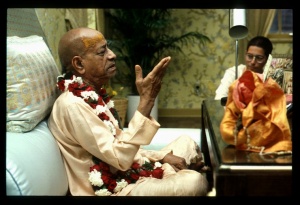SB 4.6.34: Difference between revisions
m (1 revision(s)) |
(Vanibot #0054 edit - transform synonyms into clickable links, which search similar occurrences) |
||
| (One intermediate revision by one other user not shown) | |||
| Line 1: | Line 1: | ||
{{info | {{info | ||
|speaker=Maitreya | |speaker=Maitreya Ṛṣi | ||
|listener=Vidura | |listener=Vidura | ||
}} | }} | ||
[[Category:Srimad-Bhagavatam - Canto 04 Chapter 06]] | |||
[[Category:Bhagavatam Verses Spoken by Maitreya Rsi - Vanisource|040634]] | |||
<div style="float:left">'''[[Srimad-Bhagavatam]] - [[SB 4|Fourth Canto]] - [[SB 4.6: Brahma Satisfies Lord Siva|Chapter 6: Brahmā Satisfies Lord Śiva]]'''</div> | |||
<div style="float:right">[[File:Go-previous.png|link=SB 4.6.33]] '''[[SB 4.6.33]] - [[SB 4.6.35]]''' [[File:Go-next.png|link=SB 4.6.35]]</div> | |||
{{RandomImage}} | |||
==== TEXT 34 ==== | ==== TEXT 34 ==== | ||
<div | <div class="verse"> | ||
sanandanādyair mahā-siddhaiḥ | :sanandanādyair mahā-siddhaiḥ | ||
śāntaiḥ saṁśānta-vigraham | :śāntaiḥ saṁśānta-vigraham | ||
upāsyamānaṁ sakhyā ca | :upāsyamānaṁ sakhyā ca | ||
bhartrā guhyaka-rakṣasām | :bhartrā guhyaka-rakṣasām | ||
</div> | </div> | ||
| Line 16: | Line 22: | ||
==== SYNONYMS ==== | ==== SYNONYMS ==== | ||
<div | <div class="synonyms"> | ||
sanandana- | ''[//vanipedia.org/wiki/Special:VaniSearch?s=sanandana&tab=syno_o&ds=1 sanandana]-[//vanipedia.org/wiki/Special:VaniSearch?s=ādyaiḥ&tab=syno_o&ds=1 ādyaiḥ]'' — the four Kumāras, headed by Sanandana; ''[//vanipedia.org/wiki/Special:VaniSearch?s=mahā&tab=syno_o&ds=1 mahā]-[//vanipedia.org/wiki/Special:VaniSearch?s=siddhaiḥ&tab=syno_o&ds=1 siddhaiḥ]'' — liberated souls; ''[//vanipedia.org/wiki/Special:VaniSearch?s=śāntaiḥ&tab=syno_o&ds=1 śāntaiḥ]'' — saintly; ''[//vanipedia.org/wiki/Special:VaniSearch?s=saṁśānta&tab=syno_o&ds=1 saṁśānta]-[//vanipedia.org/wiki/Special:VaniSearch?s=vigraham&tab=syno_o&ds=1 vigraham]'' — the grave and saintly Lord Śiva; ''[//vanipedia.org/wiki/Special:VaniSearch?s=upāsyamānam&tab=syno_o&ds=1 upāsyamānam]'' — was being praised; ''[//vanipedia.org/wiki/Special:VaniSearch?s=sakhyā&tab=syno_o&ds=1 sakhyā]'' — by Kuvera; ''[//vanipedia.org/wiki/Special:VaniSearch?s=ca&tab=syno_o&ds=1 ca]'' — and; ''[//vanipedia.org/wiki/Special:VaniSearch?s=bhartrā&tab=syno_o&ds=1 bhartrā]'' — by the master; ''[//vanipedia.org/wiki/Special:VaniSearch?s=guhyaka&tab=syno_o&ds=1 guhyaka]-[//vanipedia.org/wiki/Special:VaniSearch?s=rakṣasām&tab=syno_o&ds=1 rakṣasām]'' — of the Guhyakas and the Rākṣasas. | ||
</div> | </div> | ||
| Line 23: | Line 29: | ||
==== TRANSLATION ==== | ==== TRANSLATION ==== | ||
<div | <div class="translation"> | ||
Lord Śiva sat there, surrounded by saintly persons like Kuvera, the master of the Guhyakas, and the four Kumāras, who were already liberated souls. Lord Śiva was grave and saintly. | Lord Śiva sat there, surrounded by saintly persons like Kuvera, the master of the Guhyakas, and the four Kumāras, who were already liberated souls. Lord Śiva was grave and saintly. | ||
</div> | </div> | ||
| Line 30: | Line 36: | ||
==== PURPORT ==== | ==== PURPORT ==== | ||
<div | <div class="purport"> | ||
The personalities sitting with Lord Śiva are significant because the four Kumāras were liberated from birth. It may be remembered that after their birth these Kumāras were requested by their father to get married and beget children in order to increase the population of the newly created universe. But they refused, and at that time Lord Brahmā was angry. In that angry mood, Rudra, or Lord Śiva, was born. Thus they were intimately related. Kuvera, the treasurer of the demigods, is fabulously rich. Thus Lord Śiva's association with the Kumāras and Kuvera indicates that he has all transcendental and material opulences. Actually, he is the qualitative incarnation of the Supreme Lord; therefore his position is very exalted. | The personalities sitting with Lord Śiva are significant because the four Kumāras were liberated from birth. It may be remembered that after their birth these Kumāras were requested by their father to get married and beget children in order to increase the population of the newly created universe. But they refused, and at that time Lord Brahmā was angry. In that angry mood, Rudra, or Lord Śiva, was born. Thus they were intimately related. Kuvera, the treasurer of the demigods, is fabulously rich. Thus Lord Śiva's association with the Kumāras and Kuvera indicates that he has all transcendental and material opulences. Actually, he is the qualitative incarnation of the Supreme Lord; therefore his position is very exalted. | ||
</div> | </div> | ||
__NOTOC__ | |||
<div style="float:right; clear:both;">[[File:Go-previous.png|link=SB 4.6.33]] '''[[SB 4.6.33]] - [[SB 4.6.35]]''' [[File:Go-next.png|link=SB 4.6.35]]</div> | |||
__NOTOC__ | |||
__NOEDITSECTION__ | |||
Latest revision as of 21:54, 18 February 2024

A.C. Bhaktivedanta Swami Prabhupada
TEXT 34
- sanandanādyair mahā-siddhaiḥ
- śāntaiḥ saṁśānta-vigraham
- upāsyamānaṁ sakhyā ca
- bhartrā guhyaka-rakṣasām
SYNONYMS
sanandana-ādyaiḥ — the four Kumāras, headed by Sanandana; mahā-siddhaiḥ — liberated souls; śāntaiḥ — saintly; saṁśānta-vigraham — the grave and saintly Lord Śiva; upāsyamānam — was being praised; sakhyā — by Kuvera; ca — and; bhartrā — by the master; guhyaka-rakṣasām — of the Guhyakas and the Rākṣasas.
TRANSLATION
Lord Śiva sat there, surrounded by saintly persons like Kuvera, the master of the Guhyakas, and the four Kumāras, who were already liberated souls. Lord Śiva was grave and saintly.
PURPORT
The personalities sitting with Lord Śiva are significant because the four Kumāras were liberated from birth. It may be remembered that after their birth these Kumāras were requested by their father to get married and beget children in order to increase the population of the newly created universe. But they refused, and at that time Lord Brahmā was angry. In that angry mood, Rudra, or Lord Śiva, was born. Thus they were intimately related. Kuvera, the treasurer of the demigods, is fabulously rich. Thus Lord Śiva's association with the Kumāras and Kuvera indicates that he has all transcendental and material opulences. Actually, he is the qualitative incarnation of the Supreme Lord; therefore his position is very exalted.